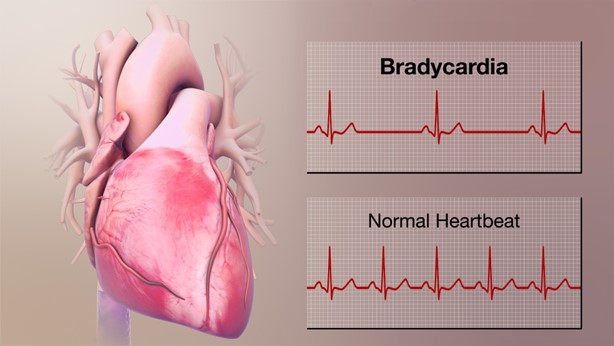A nurse in a provider's office is collecting data from a client who has hypothyroidism.
Which of the following should the nurse expect?
Bradycardia.
Moist skin.
Blurred vision.
Insomnia.
The Correct Answer is A
Hypothyroidism can cause a slowed heart rate, also called bradycardia1.

Choice B, Moist skin, is not the correct answer because it is not a commonly reported symptom of hypothyroidism.
Choice C, Blurred vision, is not the correct answer because it is not a commonly reported symptom of hypothyroidism.
Choice D, Insomnia, is not the correct answer because it is not a commonly reported symptom of hypothyroidism.
Nursing Test Bank
Naxlex Comprehensive Predictor Exams
Related Questions
Correct Answer is ["A","C"]
Explanation
A client who has an understanding of the manifestations of hyperglycemia would know that their breath may have a fruity odor.
This is due to the presence of ketones, which are produced when the body breaks down fat for energy instead of using glucose.
Choice A is also correct.
Blurry vision can be a symptom of hyperglycemia.
High blood sugar levels can cause the lens of the eye to swell, leading to changes in vision.
Choice B is incorrect because hyperglycemia can cause an increase in appetite, not a decrease.
Choice D is incorrect because hyperglycemia can cause an increase in thirst, not a decrease.
This is due to the body’s attempt to flush out excess glucose through increased urination, which can lead to dehydration and increased thirst.
Correct Answer is A
Explanation
The client’s symptoms of confusion, flushed appearance, and acetone odor on their breath suggest that they may be experiencing diabetic ketoacidosis (DKA), a serious complication of diabetes that occurs when the body produces high levels of ketones.
Treatment for DKA typically involves administering intravenous fluids and insulin to lower blood sugar levels and suppress ketone production 1.
Regular insulin is a fast-acting insulin that can be given intravenously to quickly lower blood sugar levels 1.
Choice B is incorrect because NPH insulin is an intermediate-acting insulin that takes longer to start working and would not be appropriate for treating DKA.
Choice C is incorrect because lispro insulin is a rapid-acting insulin but it is not typically given intravenously.
Choice D is incorrect because glargine insulin is a long-acting insulin that takes several hours to start working and would not be appropriate for treating DKA.
Whether you are a student looking to ace your exams or a practicing nurse seeking to enhance your expertise , our nursing education contents will empower you with the confidence and competence to make a difference in the lives of patients and become a respected leader in the healthcare field.
Visit Naxlex, invest in your future and unlock endless possibilities with our unparalleled nursing education contents today
Report Wrong Answer on the Current Question
Do you disagree with the answer? If yes, what is your expected answer? Explain.
Kindly be descriptive with the issue you are facing.
